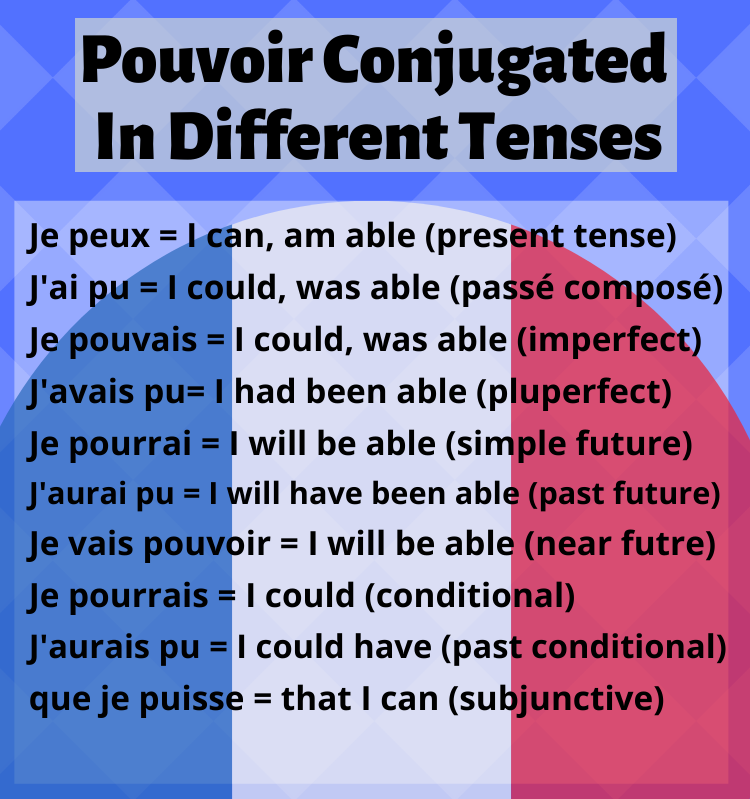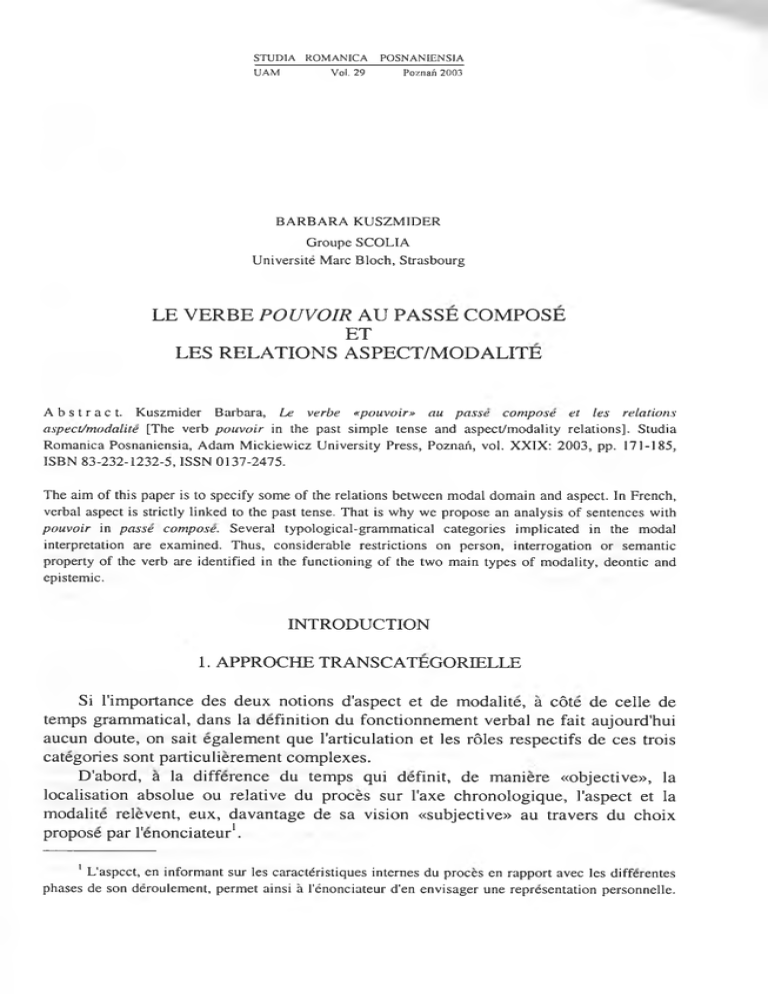
Conjugaison du verbe pouvoir
* Whereas pouvoir is a fully conjugable verb, three of its common English equivalents - can, may, and might - are modal verbs, which have just a single form. Pouvoir in Past Tenses Pouvoir has different meanings in the passé composé and imparfait .

Le verbe POUVOIR Verbe pouvoir, Mots français, French expressions
To conjugate the passé composé we use the present tense of avoir or être as an auxiliary verb, followed by the past participle (participe passé) of the main verb. In negative sentences, the past participle comes after the second part of the negation (pas). Example:

Frans Pouvoir Passé Composé YouTube
Pouvoir means "can" or "to be able to". In other terms, it means the ability or capacity to do something. However, in some contexts, pouvoir can be translated as knowing how to do something or used to express permission or politeness. Let's see it in detail with concrete examples. Pouvoir as can or to be able to

Français — Pouvoir au passé composé YouTube
Conjugaison du verbe pouvoir voir la définition actif indicatif présent je peux / je puis tu peux il peut / elle peut nous pouvons vous pouvez ils peuvent / elles peuvent imparfait je pouvais tu pouvais il pouvait / elle pouvait nous pouvions vous pouviez ils pouvaient / elles pouvaient passé simple je pus tu pus il put / elle put nous pûmes

[HD] French grammar Le verbe "pouvoir" YouTube
Présent je p eux tu p eux il p eut nous p ouvons vous p ouvez ils p euvent Passé composé j'ai p u tu as p u il a p u nous avons p u vous avez p u ils ont p u Imparfait je p ouvais tu p ouvais il p ouvait nous p ouvions vous p ouviez ils p ouvaient Plus-que-parfait j'avais p u tu avais p u il avait p u nous avions p u

Conjugaison du verbe pouvoir YouTube
Pouvoir au Passé composé. À la 1 ère personne du singulier (je) et au passé composé, la conjugaison du verbe pouvoir s'écrit "j'ai pu" et prend la terminaison "u". À la 2 ème personne du singulier (tu) et au passé composé, la conjugaison du verbe pouvoir s'écrit "tu as pu" et prend la terminaison "u". À la 3 ème personne du.

Le Verbe Pouvoir au Passé Composé To Be Able Can Compound Tense
The French verb pouvoir means "to be able [to do something]," or more simply, "can" and "may." It's an extremely common verb in French and has an irregular conjugation that can be tricky for non-native speakers. For this conjugation, it's best to learn it by heart. Pouvoir and Politeness in French

French Verb Pouvoir Worksheet Passé Composé 6 Activities One Page
1 re forme 2 e forme Indicatif Présent je p eux tu p eux il p eut nous p ouvons vous p ouvez ils p euvent Passé composé j'ai p u tu as p u il a p u nous avons p u vous avez p u ils ont p u.

pouvoir Conjugaison du verbe pouvoir
Passé composé (Present perfect) j'ai p u tu as p u il a p u nous avons p u vous avez p u ils ont p u Imparfait (Imperfect) je p ouvais tu p ouvais il p ouvait nous p ouvions vous p ouviez ils p ouvaient Plus-que-parfait (Pluperfect) j'avais p u tu avais p u il avait p u nous avions p u vous aviez p u

Pouvoir Conjugation French FrenchLearner (2022)
POUVOIR Passé Composé. Learn and practice French with this conjugation:POUVOIR Passé Composé. The verb "To be able - can" is conjugated this way in Perfect tense: Le verbe "Pouvoir Passé Composé" se conjugue de la façon suivante: J'ai pu, tu as pu, il a pu, elle a pu, nous avons pu, vous avez pu, ils ont pu, elles ont pu.
Conjugaison du verbe pouvoir au passé composé de l'indicatif Vidéo
Firefox and Chrome users: install a shortcut (Firefox or Chrome) then type "conj pouvoir" in your address bar for the fastest conjugations. pouvoir 'pouvoir' is the model of its conjugation.. passé composé; j' ai pu: tu: as pu: il, elle, on: a pu: nous: avons pu: vous: avez pu: ils, elles: ont pu: plus-que-parfait; j' avais pu: tu: avais.

le verbe pouvoir au passe compose et les relations aspect
Conjugaison du verbe pouvoir en français : auxiliaires, temps composés, temps simples, présent, passé, plus-que-parfait, futur, impératif, participe passé, subjonctif, conditionnel, les verbes irréguliers. La traduction du verbe pouvoir en contexte

French lesson with Vincent = Unit 6 = Lesson I = Le passé composé
Pouvoir Passé Composé. The passé composé of Pouvoir is formed by combining the auxiliary verb avoir with the past participle pu. Pouvoir Participe Présent. The participe présent of Pouvoir is pouvant. Regular vs. Irregular Verbs. A verb is called a regular verb when its conjugation follows a typical pattern.

Pouvoir Conjugation In The Passé Composé Language Atlas
POUVOIR s'emploie au subjonctif présent par une manière de vœu, de souhait. Puisse le ciel vous donner de longs jours! Puissiez-vous réussir dans vos projets! Puissent vos projets réussir! Puisse-t-il arriver bientôt! POUVOIR se dit encore pour marquer la possibilité de quelque événement, de quelque dessein. Un accident pourrait arriver.

French verbs Elsa French Teacher
Conjugation au masculin à la voix active avec l'auxiliaire avoir. Verb pouvoir au masculin à la voix active avec l'auxiliaire avoir. Definition and spelling of verb pouvoir.. Fréquent - Intransitif - Autorise la forme pronominale - Participe Passé Invariable . Shape of sentence. Near future. je vais pouvoir tu vas pouvoir il va pouvoir.

[Verbes modèles] [3] Pouvoir Passé composé YouTube
The present tense conjugation of pouvoir is: Je peux (I can), Tu peux (you can, familiar), Il, elle, on peut (He, she, one can), Nous pouvons (We can), Vous pouvez (You can, formal and plural) and Ils, elles peuvent (They can). Pouvoir is an French irregular verb.